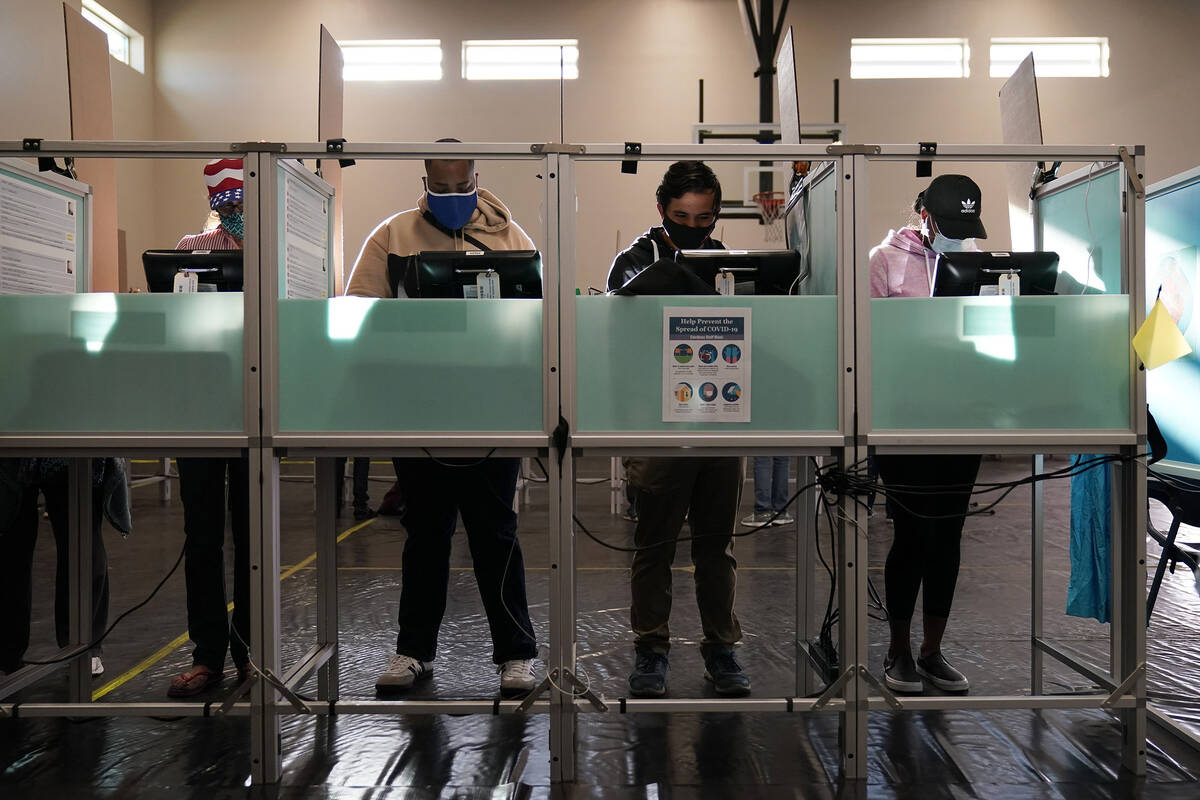Nonpartisans now make up largest voting bloc in Nevada
Nonpartisan voters now make up the largest group of registered voters in Nevada, an ongoing shift that could signify a dissatisfaction with party politics.
According to data released by the Nevada secretary of state’s office this week, there are more than 605,000 registered nonpartisans, surpassing the nearly 602,000 registered Democrats and 551,000 registered Republicans.
The increase in nonpartisan voters can in part be attributed to the state’s automatic voter registration system approved in 2018, in which people who qualify to vote are automatically registered at the Department of Motor Vehicles. If they don’t specify a particular party when they fill out the form at the DMV, they are enrolled as a nonpartisan voter by default.
Secretary of State Cisco Aguilar said in a statement that Nevada’s Automatic Voter Registration System has made it easier for eligible Nevada citizens to register or update their registration.
“No matter what party a voter chooses to register as, or if they choose no party at all, each voter has an equal voice in Nevada’s democratic process,” Aguilar said. “This growth shows that the future of Nevada’s democracy is bright.”
Though the automatic registration system is one reason for the rise in nonpartisans, the percentage of nonpartisan voter registration has steadily increased in Nevada for more than a decade, while registration in the two major political parties has declined.
In July 2003, nonpartisan voters made up about 15 percent of registered voters in the Silver State, with Republicans at 41 percent and Democrats at 40 percent. Twenty years later, nonpartisans now make up 31.86 percent, with Democrats at 31.69 percent and Republicans at 29.02 percent.
Why they’re nonpartisan
Elliot Malin, a 31-year-old Reno resident and lobbyist, changed his voter registration from Republican to nonpartisan before last year’s election.
“I just don’t feel like I belong in the party I was a member of for so long,” Malin said.
He said both of the major parties talk about issues that don’t really matter, although he thinks the Republican Party has gotten better about that recently, shifting to a message that is more encompassing of voters.
Nevada has high gas rates, and it is expensive to live in the state, Malin said. He thinks those are the issues that Nevadans want to see addressed.
“I also think that Nevadans are tired of the same old stuff, the same old complaints, the same old partisan bickering and fighting,” Malin said. “They want solutions.”
Malin, who is Jewish, also thinks antisemitism has become prevalent in both of the major parties.
“It’s very hard to feel like I have a home in the political process,” he said.
Anna Abbott, a 44-year-old Las Vegas resident, said she used to be Republican but switched to nonpartisan a couple of years ago. She doesn’t feel like the voting system and the selection of candidates are worth her time.
“I think our options are a joke, to be perfectly honest,” Abbott said. “It’s more about money and power than it is about the people and what’s right.”
To earn her vote, Abbott would like to see more politicians focus on improving Nevada’s education system.
Earning nonpartisans’ votes
With political races in the last election coming down to just a few hundred votes, nonpartisan voters could play a crucial role in determining the outcomes of elections.
One challenge, however, is getting nonpartisans to turn out to vote. According to a previous Las Vegas Review-Journal report, nonpartisans do not vote at the same rate as registered Republicans and Democrats.
Political science experts have said there is a misconception that independents vote as a bloc. They may be increasingly dissatisfied with state and local parties, or have a general disinterest in politics as a whole.
So how will the major political parties attract them?
Hilary Barrett, executive director of the Nevada State Democratic Party, said in a statement to the Review-Journal that the party understands that Nevada’s nonpartisan voters are key to winning close elections, and Barrett attributed past election wins for Democrats to the work they did to reach those voters.
“Continuing this success in 2024 will be possible by continuing this work, communicating to these voters about Democrats’ record of delivering for Nevadans and holding Republicans accountable for their out-of-touch agenda,” Barrett said.
Nevada Republican Party Chairman Michael McDonald said the party is using all of its resources to appeal to nonpartisan voters, and he believes Republicans’ messaging will appeal to them.
“People can’t afford to live,” he said. “Some people can’t afford to have power. … Our policies are stronger for the working middle class, providing opportunities for the middle class.”
McDonald said the Republican Party in Nevada had a “mass exodus” in 2015 when elected Republicans voted for the “largest tax hike in history.”
Contact Jessica Hill at jehill@reviewjournal.com. Follow @jess_hillyeah on Twitter.






















